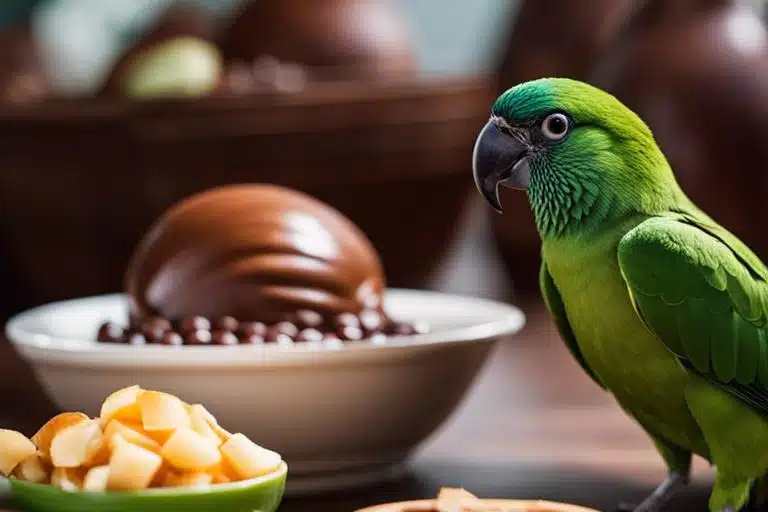You love your pet bird and want to keep them healthy and happy. But did you know that some common foods that humans enjoy can actually be toxic to birds? It’s important to be aware of these dangerous foods and never feed them to your feathered friend. Here are some foods you should never feed to your pet bird:
- Avocado: Avocado contains persin, a substance that can cause heart damage, respiratory difficulty, weakness, and even sudden death in birds. Skip the guacamole and offer your bird a safer snack like a carrot stick or pea pod instead.
- Caffeinated beverages: Caffeine can increase heart rate, induce hyperactivity, and even cause cardiac arrest in birds. Stick to water or fruit juice for your thirsty bird.
- Chocolate: Chocolate contains theobromine and caffeine, which can cause vomiting, diarrhea, hyperactivity, seizures, and even death in birds. Opt for safe alternatives like mango, papaya, or grape.
- Salt: Excessive salt intake can lead to dehydration, kidney failure, and death in birds. Offer low-salt snacks like unsalted popcorn or pretzels instead.
- Fat: Birds, like humans, can develop health issues from consuming high-fat foods. Limit fatty snacks and offer lean options like nuts in moderation.
While most fruits are safe for birds, it’s important to remove fruit pits and apple seeds as they contain a small amount of cyanide. Onions and garlic may have health benefits for humans, but they are toxic to birds and can cause ulcers, anemia, and weakness. Avoid giving your bird foods containing these ingredients and opt for vitamin A-rich options like hot peppers instead.
Additionally, xylitol, an artificial sweetener found in sugar-free products, can be harmful to birds and should be avoided. Stick to a natural diet of fruits and vegetables to keep your bird healthy and happy.
Be mindful of, if your bird ingests any of these toxic foods, contact your veterinarian immediately for guidance on treatment. Keep your feathered companion safe and healthy by being mindful of what you feed them.

Key Takeaways:
- Toxic Foods: Avocado, caffeine, chocolate, salt, fruit pits and apple seeds, onions and garlic, xylitol are common foods that are toxic to pet birds.
- Safe for Birds: Remove pits and seeds from fruits like apples, cherries, and peaches to make them safe for birds to consume. Stick to feeding birds foods like grapes, citrus fruits, squash, and berries which are safe and healthy for them.
- Never Feed: Avoid offering your pet bird dairy products, caffeine-containing beverages, chocolate-containing foods, onions, garlic, and artificial sweeteners like xylitol as they can be harmful and even fatal to birds.
Deadly Foods for Birds
The Dangers of Avocado
Some birds may find avocado enticing, but this seemingly harmless fruit can be deadly to our feathered friends. The avocado plant contains persin, a substance that can cause heart damage, respiratory difficulties, weakness, and even sudden death in birds. Although certain types of avocados have been safely consumed by some bird species, it’s best to avoid feeding avocado altogether to ensure the safety of your pet bird. Skip the guacamole and opt for safe options like carrot sticks or pea pods.
Why Chocolate is Harmful to Birds
Birds should never be offered chocolate or chocolate-containing foods as even small amounts can be potentially toxic. Chocolate contains theobromine and caffeine, which can lead to vomiting, diarrhea, increased heart rate, hyperactivity, tremors, seizures, and even death in birds. To keep your feathered companion safe, always avoid feeding any chocolate treats and instead offer them pieces of fruit like mango, papaya, or grapes.
With the serious potential effects of chocolate on birds, it’s crucial to remember that even a small indulgence can have devastating consequences. The theobromine and caffeine in chocolate can cause respiratory distress, hyperactivity, and even seizures in birds, making it a dangerous and potentially deadly treat for your feathered friend.
Substances with Hidden Risks
The Effects of Caffeine and Salt
Hidden in many everyday foods and beverages, caffeine and salt pose serious risks to your pet bird’s health. Caffeine can increase heart rate, induce arrhythmias, and even cause cardiac arrest. Even a small sip of caffeinated beverages can be toxic to your feathered friend. Similarly, even a tiny amount of salt can upset the electrolyte balance in a bird’s body, leading to dehydration, kidney failure, and even death. It’s crucial to avoid offering caffeinated beverages and salty treats to your bird and opt for safe and healthy alternatives like water or unsalted popcorn.
Perils of Xylitol and Fatty Foods
Xylitol, a common artificial sweetener found in sugarless gum and diet foods, can cause hypoglycemia, liver damage, and even death in animals like dogs. While its effects on birds haven’t been extensively studied, birds have a faster metabolism and may be highly sensitive to the toxic effects of xylitol. Additionally, fatty foods can lead to obesity, high cholesterol, and coronary artery disease in certain bird species. It’s crucial to avoid exposing your pet bird to xylitol and limit their intake of fatty snacks to keep them healthy and happy.

Fruits and Vegetables to Avoid
Toxicity of Fruit Pits and Apple Seeds
Now, let’s talk about the potential dangers posed by fruit pits and apple seeds to your pet bird. While most fruit is safe and generally healthy for birds to consume, certain fruits containing seeds and pits, such as cherries, apricots, peaches, nectarines, and plums, should not be offered to birds without removing the seeds and pits first. These seeds and pits contain small amounts of a cardiac-toxic cyanide compound which can be harmful to birds if ingested. Without the seeds and pits, these fruits are completely safe for birds to consume.
The Harm in Onions and Garlic
Vegetables like onions and garlic, while healthy for humans, are actually toxic to birds. Onions contain sulfur compounds that can irritate a bird’s mouth, esophagus, or crop, causing ulcers, and can induce rupture of red blood cells resulting in anemia. Garlic contains allicin, another chemical that can cause anemia and weakness in birds. Therefore, it’s crucial to avoid feeding onions and garlic to your pet bird to prevent any potential health issues.
When offering fruits and vegetables to your pet bird, always be cautious and mindful of the harmful effects certain foods can have on their health. Avoid feeding your bird fruits with toxic pits and seeds, as well as onions and garlic, to keep them safe and healthy.
Safe Alternatives
Healthful Treats for Your Bird
Treats are a great way to bond with your pet bird while providing them with some variety in their diet. Offer safe and healthy treats like a small piece of mango, papaya, or grape. These fruits are healthy for birds and can be a refreshing alternative to potentially toxic foods. Recall, even a small indulgence can make your feathered friend feel special.
How to Provide a Balanced Avian Diet
With parrots being prone to health problems, it’s imperative to feed your pet bird a balanced diet. For instance, avoid feeding them foods like avocado, dairy products, onions, and garlic, which can be toxic to birds. Instead, prioritize a diet rich in fruits, vegetables, and lean proteins like cooked meats. Always ensure your bird has access to fresh, clean water and a variety of safe and healthy foods to promote optimal health.
Final Words
From above, it is crucial to be aware of the common toxic foods you should never feed your pet bird to ensure their well-being and health. Avocado, chocolate, caffeine, salt, fruit pits and apple seeds, onions, garlic, and xylitol are all foods that can be harmful or even dangerous to birds. Keeping your bird’s diet free of these harmful substances is imperative to prevent health problems and potential toxicity. For more information on toxic foods for birds, visit Toxic Foods for Birds.

FAQ: Common Toxic Foods You Should Never Feed Your Pet Bird
Q: Are avocados safe for birds?
A: Avocados are toxic to birds. The leaves of the avocado plant contain persin, which can cause heart damage, respiratory difficulty, weakness, and even sudden death in birds. It’s best to avoid feeding avocados to your pet bird. Birds should be offered safe fruits like carrots or peas instead.
Q: Can birds consume dairy products?
A: Dairy products are not recommended for birds. Birds do not have the necessary enzymes to digest lactose found in dairy products, which can lead to digestive issues and discomfort. It’s best to avoid offering dairy to your pet bird and stick to bird-friendly foods.
Q: What foods should never be fed to pet birds?
A: There are several common foods that should never be fed to pet birds due to their potential toxicity. These include caffeine-containing beverages, chocolate, salty foods, fruit pits, and apple seeds, onions, garlic, and xylitol, an artificial sweetener. These foods can cause a range of health problems in birds, from digestive issues to organ damage and even death.
Pertaining to feeding your pet bird, always be mindful of the foods you offer. Here is a breakdown of toxic foods and safe alternatives for your feathered friend:
| Toxic Foods for Birds | Safe Alternatives |
|---|---|
| Avocado | Carrots or peas |
| Caffeinated beverages | Water or fruit juice |
| Chocolate | Sugary fruits like mango or papaya |
| Salty foods | Unsalted popcorn or low-salt crackers |
| Onions and garlic | Small piece of hot pepper |
It’s important to be aware of the potential dangers of feeding toxic foods to your pet bird. By following proper dietary guidelines and offering safe and healthy options, you can help keep your bird happy, healthy, and thriving.
As a bird enthusiast with a passion for sharing the wonders of our feathered friends. As a writer and nature lover, I'm thrilled to connect with fellow bird buffs and inspire others to take flight into the fascinating world of birds. Let's wing it together!


